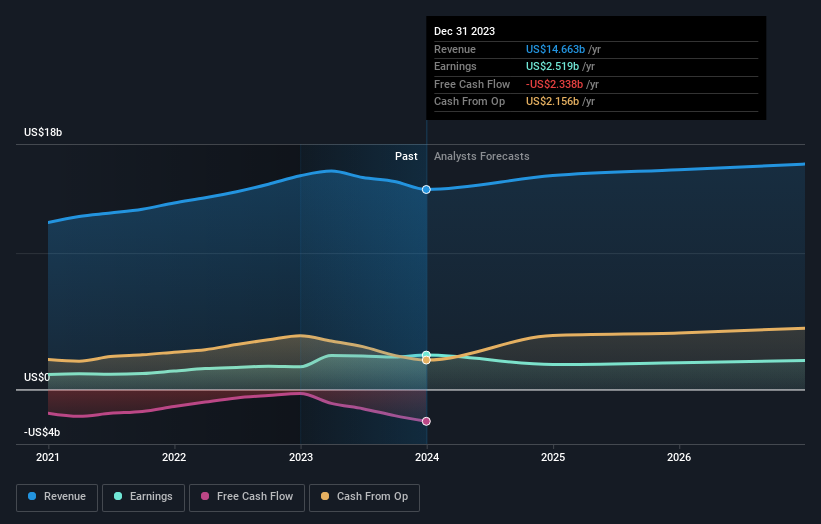Here's What Analysts Are Forecasting For Consolidated Edison, Inc. (NYSE:ED) After Its Annual Results
The annual results for Consolidated Edison, Inc. (NYSE:ED) were released last week, making it a good time to revisit its performance. Revenues came in 2.6% below expectations, at US$15b. Statutory earnings per share were relatively better off, with a per-share profit of US$7.25 being roughly in line with analyst estimates. The analysts typically update their forecasts at each earnings report, and we can judge from their estimates whether their view of the company has changed or if there are any new concerns to be aware of. So we collected the latest post-earnings statutory consensus estimates to see what could be in store for next year.
See our latest analysis for Consolidated Edison
After the latest results, the twelve analysts covering Consolidated Edison are now predicting revenues of US$15.7b in 2024. If met, this would reflect a reasonable 7.0% improvement in revenue compared to the last 12 months. Statutory earnings per share are forecast to tumble 27% to US$5.32 in the same period. Before this earnings report, the analysts had been forecasting revenues of US$15.5b and earnings per share (EPS) of US$5.35 in 2024. The consensus analysts don't seem to have seen anything in these results that would have changed their view on the business, given there's been no major change to their estimates.
There were no changes to revenue or earnings estimates or the price target of US$90.89, suggesting that the company has met expectations in its recent result. There's another way to think about price targets though, and that's to look at the range of price targets put forward by analysts, because a wide range of estimates could suggest a diverse view on possible outcomes for the business. Currently, the most bullish analyst values Consolidated Edison at US$103 per share, while the most bearish prices it at US$75.00. Analysts definitely have varying views on the business, but the spread of estimates is not wide enough in our view to suggest that extreme outcomes could await Consolidated Edison shareholders.
Another way we can view these estimates is in the context of the bigger picture, such as how the forecasts stack up against past performance, and whether forecasts are more or less bullish relative to other companies in the industry. It's clear from the latest estimates that Consolidated Edison's rate of growth is expected to accelerate meaningfully, with the forecast 7.0% annualised revenue growth to the end of 2024 noticeably faster than its historical growth of 5.6% p.a. over the past five years. By contrast, our data suggests that other companies (with analyst coverage) in a similar industry are forecast to grow their revenue at 3.3% per year. It seems obvious that, while the growth outlook is brighter than the recent past, the analysts also expect Consolidated Edison to grow faster than the wider industry.
The Bottom Line
The most obvious conclusion is that there's been no major change in the business' prospects in recent times, with the analysts holding their earnings forecasts steady, in line with previous estimates. Fortunately, they also reconfirmed their revenue numbers, suggesting that it's tracking in line with expectations. Additionally, our data suggests that revenue is expected to grow faster than the wider industry. There was no real change to the consensus price target, suggesting that the intrinsic value of the business has not undergone any major changes with the latest estimates.
Keeping that in mind, we still think that the longer term trajectory of the business is much more important for investors to consider. We have estimates - from multiple Consolidated Edison analysts - going out to 2026, and you can see them free on our platform here.
You should always think about risks though. Case in point, we've spotted 4 warning signs for Consolidated Edison you should be aware of, and 2 of them are concerning.
Have feedback on this article? Concerned about the content? Get in touch with us directly. Alternatively, email editorial-team (at) simplywallst.com.
This article by Simply Wall St is general in nature. We provide commentary based on historical data and analyst forecasts only using an unbiased methodology and our articles are not intended to be financial advice. It does not constitute a recommendation to buy or sell any stock, and does not take account of your objectives, or your financial situation. We aim to bring you long-term focused analysis driven by fundamental data. Note that our analysis may not factor in the latest price-sensitive company announcements or qualitative material. Simply Wall St has no position in any stocks mentioned.

